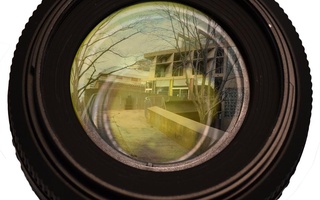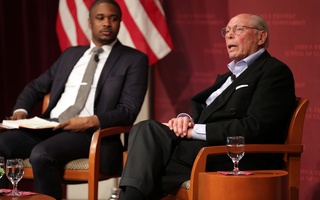{shortcode-fbc001656233814b35f8ad7aa2e223dc5b960f06}
There’s something undeniably mysterious about the VES Department’s film track here at Harvard. Yes, students know that the well-known acronym stands for Visual and Environmental Studies and that it probably isn’t the place to go if your primary academic interests fall within the realms of entomology or environmental sustainability.
A quick visit to the department’s stylish website doesn’t necessarily clear up the confusion surrounding the department. You’ll find a faculty directory brimming with lauded and award-winning artists and professors. You’ll see that its concentration tracks include areas like studio film and film studies, with objectives like exploring the history and theory of abstract concepts such as “the moving image” and “the built environment.” But it’s likely that you’ll find yourself still wondering about what exactly the VES Department offers.
Take a look at 10 different theses from the department’s film track and you might just get 10 different answers. You’ll be just as likely to come across crass, purposefully obnoxious parodies of reality TV kitsch as you will be to find subtle, thoughtful documentaries about social injustices in little-known places. The scope and range of student projects produced each year speaks to uniqueness of the program.
One might assume that students in the VES film track hold high aspirations for distinguished careers in the film industry, and for good reason. However, by heavily emphasizing creativity over vocational training, the department differs even from film programs offered by other liberal arts institutions. Though such a structure runs the risk of alienating some interested in pursuing film on campus, the VES Department’s film track gets overwhelmingly high marks from students both within and without.
A LIBERAL ARTS EDUCATION
Not to be confused with conservatory-style film programs such as those boasted by NYU’s Tisch School and USC’s School of Cinematic Arts, Harvard’s undergraduate VES film track has a distinct liberal arts slant. According to Robb Moss, the department’s chair and a professor in film and film studies, the emphasis on liberal arts education is something that the VES faculty values tremendously, one that uniquely shapes the filmmaking experience here at Harvard. “We think about filmmaking here in a somewhat different way. We aren’t exactly a film school; we aren’t an art school; yet we do art; we do film. We are a small liberal arts program,” he said in a phone interview.
{shortcode-744296e65bd6c18bdde82eefea0e82f4b51b75b9}
Moss explains that much of the difference between liberal arts programs and art school programs is a result of opposing pedagogical styles. “We aren’t working backwards from getting people employment in the ways that a film school does,” he said. “Film schools tend to be organized, and rightly so, around the industrial model of filmmaking broken into its constituent parts. There are courses in cinematography or editing or directing actors, or all the pieces that go into film production.”
At Harvard, Moss said, professors and department staff are more interested in the development of students as artists than they are as craftsmen. "We value [those] crafts, they are certainly important, but they are important in the service of students’ authorial voice. The courses that we teach are more organized around students authoring their own work and having the tools to be expressive about their ideas,” he said.
Alfred Guzzetti, a professor of visual arts in the VES Department, agrees with Moss. In professional training programs, he said, “Three-fourths of time is devoted to the learning of film techniques, and the remaining fourth is set aside for the liberal arts education, such as literature and history.” This, he holds, places an emphasis on teaching students the more explicitly practical aspects of filmmaking through classes such as cinematography and directing, while inherently deemphasizing non craft-oriented studies.
INSIDE THE ART HOUSE
In addition to opportunities to experiment with form, the liberal arts focus of Harvard’s film track allows students the opportunity to make films that span academic disciplines. In the Fall of 2010, Guzzetti collaborated with Music professor Hans Tutschku to offer a course entitled “Electro-acoustic Music and Video in Dialogue.” (VES 157t) The class brought together student filmmakers and student composers with the goal of promoting mutual teaching and learning through the creation of audio-visual projects.
Guzzetti recalls a particularly interesting assignment in which student filmmaker/composer teams were given two projectors, two screens, and four channels of sound, and instructed to make a one-minute long piece in which the imagery and the sound were derived from water. The pairs were made to do the project twice: once with the student composer creating the music and the student filmmaker creating the video, and later with the composer producing the video and the filmmaker the music. Guzzetti credits Harvard’s expansive resources with the ability to undertake such unique and exciting endeavors. “It was a very situation-dependent course. It just so happens that Harvard has an electronic music studio, and it also happens that at Harvard it’s very easy for faculty members to do collaborations,” he said.
For concentrators in the film track, access to varying academic possibilities directly correlates to more creative outlets. Max R. McGillivray ’16, who focuses on film in VES, states that the abundance of creative possibility attracted him to the program. He made his decision to come to Harvard after visiting the VES Department his senior year of high school. He, too, praises the department’s emphasis on the unique ways that the program got its students to think. “I think it’s a great aspect because it gets you out of the way of thinking of filmmakers from other schools,” he said. “I think that’s a very freeing part of the program. You’re not making the same films as everyone else.”
Read more in Arts
'Gone Girl' Chills and ThrillsRecommended Articles
-
 The Scenic Route
The Scenic Route -
Hong Resists Conclusions“You’re stuck with a certain view for your entire life,” said Hong, “and only once in a while, you see things differently. I think that’s a great thing. That’s what I try to do.”
-
Students Screen Original DocumentariesFrom breastfeeding to undocumented workers, Harvard students tackled a wide range of subjects in five short documentary films showcased at Doc Festival 2012, the inaugural film festival hosted by the Harvard Law Documentary Studio.
-
 Framing Harvard Film
Framing Harvard Film -
 'Rocky' Director Parses the Politics of Filmmaking
'Rocky' Director Parses the Politics of Filmmaking













